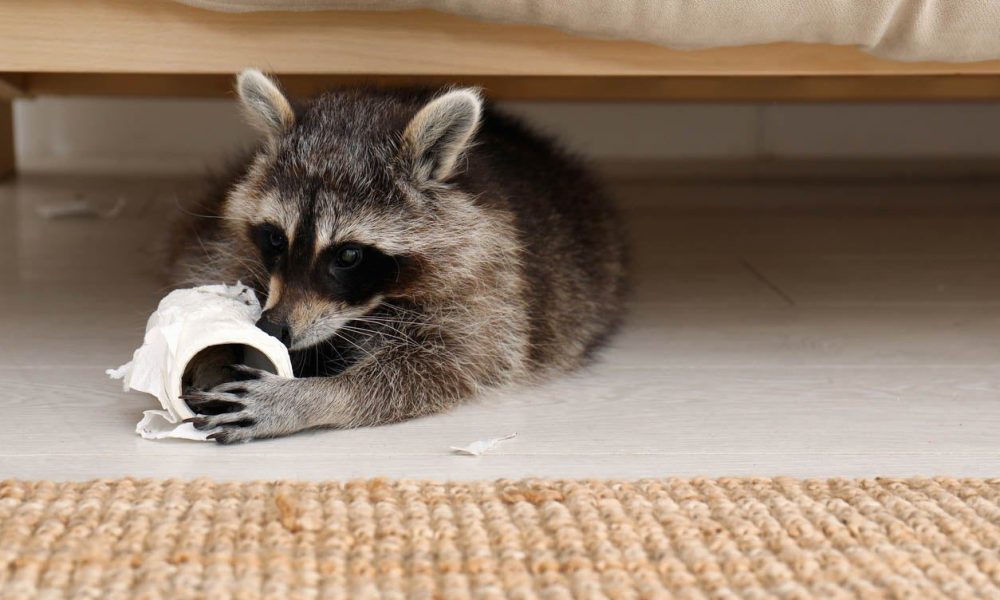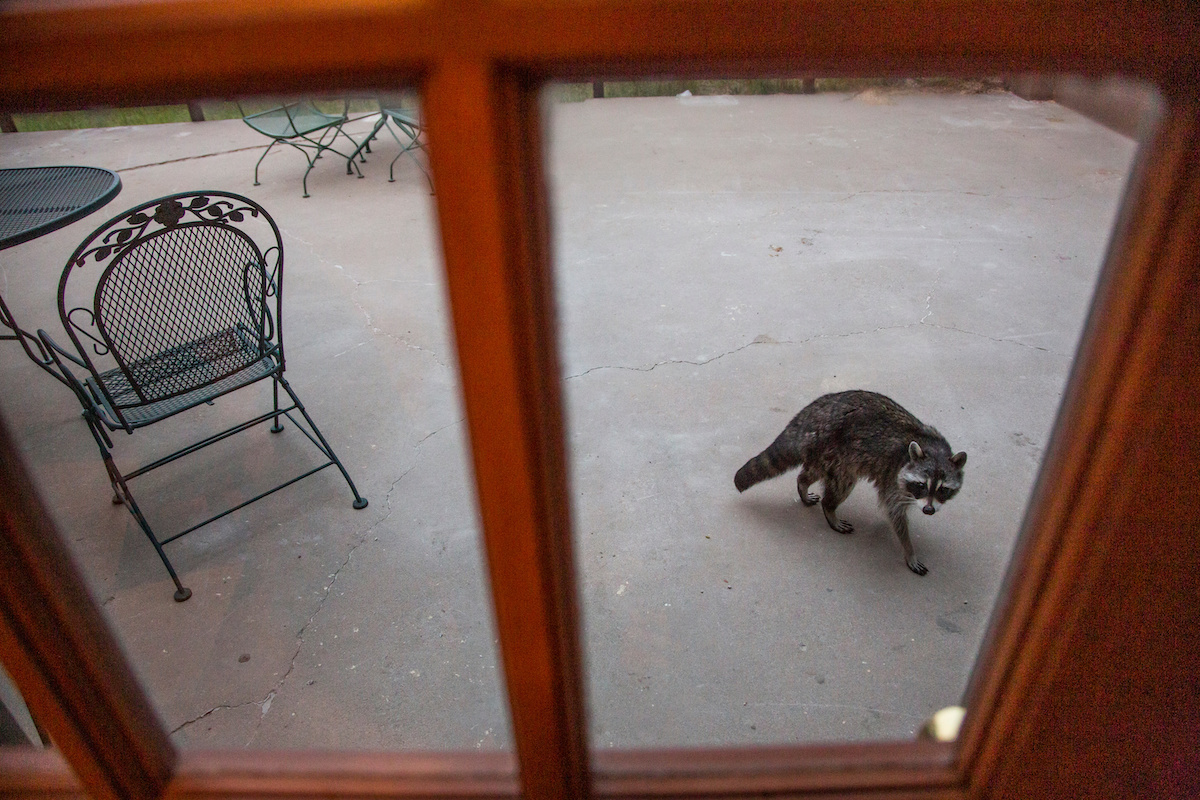
Hearing loud bangs in the night? Your home might be the new hideout for the local raccoon family. Even if you aren’t dealing with an infestation, it’s still a good idea to practice effective prevention techniques. But how can you raccoon-proof your Florida home, anyway? At World Class Wildlife, we’ll walk you through practical steps to protect your home, helping you to keep raccoons outdoors and away from your family and pets.
Here’s Why Raccoons Want Inside Your Home
Have you ever wondered why raccoons seem to be so interested in your home? These nocturnal animals are incredibly resourceful, seeking out easy food sources and cozy shelter. Understanding their behavior is the first step in preventing them from turning your home into their playground.
Raccoons Are Opportunistic Feeders
- Looking for Food: Raccoons are attracted to homes that provide easy access to food, whether it’s garbage, pet food, or even bird feeders.
- Seeking Shelter: They look for warm, dry spaces to nest, such as attics, chimneys, and crawl spaces.
Raccoons Are Skilled Climbers
- Roof Access: Raccoons can climb trees and gutter systems to reach your roof, where they may find entry points into your attic.
- Dexterous Paws: Their nimble paws allow them to open latches, move objects, and manipulate barriers, making it challenging to keep them out.
Raccoon-Proof Your Home by Securing Entry Points
A raccoon doesn’t need a large hole to squeeze into your attic or crawl space. The first line of defense is to identify and secure all potential entry points from these fluffy raiders. But how do you find these hidden access areas?
Inspecting Your Home Thoroughly
- Roof and Chimneys: Examine the roof for loose shingles, gaps around chimneys, and openings in soffits or vents. Raccoons can easily enter through these weak spots.
- Foundation and Crawl Spaces: Look for cracks, holes, or gaps in the foundation. Raccoons can dig under loose foundations or squeeze through small gaps.
- Attic Vents: Make sure that your attic vents are securely covered with a heavy-duty wire mesh that raccoons can’t tear through.
Installing Barriers
- Chimney Caps: Install a secure chimney cap to prevent raccoons from entering your home through the chimney.
- Heavy-Duty Screens: Use heavy-duty screens to cover vents and other openings. Keep the screens securely fastened. Screens should also be made from materials that are resistant to tearing.
- Seal Gaps and Holes: Use caulking, steel wool, or expandable foam to seal any cracks or holes that could allow entry.

Managing Outdoor Attractants
Raccoons are naturally drawn to areas where food is readily available. If your yard provides easy meals, you might be unknowingly inviting them onto your property. What steps can you take to make your yard less appealing?
Securing Garbage and Compost
- Use Raccoon-Proof Containers: Invest in heavy-duty garbage bins with locking lids that raccoons can’t open. Place them in a secure location, preferably in a shed or garage.
- Compost Management: If you compost, avoid adding food scraps that could attract raccoons. Instead, focus on yard waste and ensure your compost bin is secure.
Removing Food Sources
- Pet Food: Avoid leaving pet food outside overnight. Feed your pets indoors or remove any leftover food after feeding.
- Bird Feeders: Consider using raccoon-proof bird feeders or take them down at night when raccoons are most active.
Yard Maintenance
- Trim Trees and Shrubs: Raccoons use trees and shrubs as ladders to reach your roof. Keep branches trimmed and away from the house.
- Clear Debris: Remove piles of leaves, wood, and other debris where raccoons might hide or nest.
Protecting Your Garden
Is your garden serving as a buffet for raccoons? These night prowlers are notorious for raiding gardens, especially if you grow fruits and vegetables. How can you keep them from feasting on your hard-earned produce?
Garden Fencing
- Install Sturdy Fencing: Use a sturdy fence at least four feet high, with the bottom buried six inches into the ground to prevent raccoons from digging underneath.
- Electric Fences: For added protection, consider installing a low-voltage electric fence around the garden’s perimeter.
Using Repellents
- Natural Repellents: Sprinkle cayenne pepper, garlic, or strong-smelling essential oils around the garden. These natural repellents can deter raccoons from entering.
- Motion-Activated Sprinklers: Install motion-activated sprinklers that will startle and scare away raccoons when they approach your garden.
Handling Raccoon Encounters at Home
Do you know what to do if you spot a raccoon around your home? Don’t panic! Finding a raccoon on your property can be alarming, but it’s important to handle the situation calmly and safely. What’s the best course of action?
Avoiding Confrontation
- Do Not Approach: Never attempt to approach or corner a raccoon. These animals can be aggressive if they feel threatened.
- Secure Pets: Keep pets indoors or on a leash to prevent them from coming into contact with raccoons.
Contacting Professionals
- Trapping and Relocation: If a raccoon has taken up residence in your home or yard, it’s best to contact a professional wildlife removal service. They have the expertise to trap and relocate raccoons humanely.
- Repairing Damage: After the raccoon has been removed, assess any damage to your home and make the necessary repairs to prevent future intrusions.
Maintaining Your Raccoon-Proof Home
Once you’ve taken steps to raccoon-proof your home, it’s important to maintain these efforts to keep your home secure. What are some ongoing practices that can help?
Regular Inspections
- Routine Checks: Regularly inspect your home for new entry points, especially after storms or strong winds that could cause damage.
- Seasonal Maintenance: As the seasons change, take time to assess and address potential vulnerabilities in your home’s exterior.
Need help with regular raccoon inspections? Call us at World Class Wildlife!
Continued Yard Care
- Consistent Cleaning: Keep your yard clean and free of debris that could attract raccoons.
- Secure Storage: Continue using raccoon-proof containers for garbage, compost, and pet food.
Monitoring Wildlife Activity
- Stay Alert: Keep an eye on local wildlife activity. If you notice an increase in raccoon sightings in your neighborhood, take extra precautions to protect your home.
Raccoon-Proof Your Florida Home with World Class Wildlife
Raccoon problems tend to pop up during the winter season. But it’s never to early for inspections, especially when you want to prevent infestations. Call us now to set up an inspection and keep raccoons out of your home.
